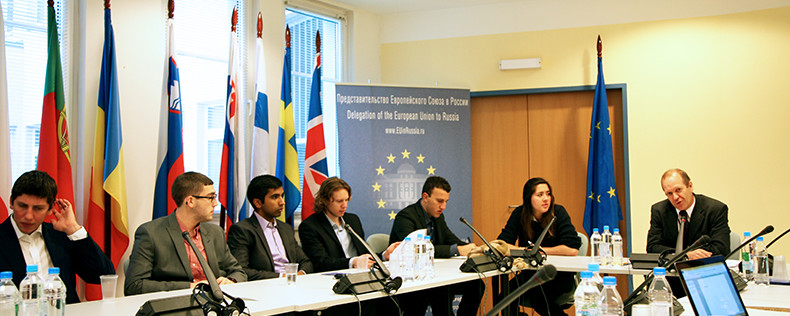Course Syllabus
Globalization and European Economies D |
 |
| Semester & Location: |
Spring 2024 - DIS Copenhagen |
| Type & Credits: |
Core Course - 3 credits |
| Core Course Study Tours: |
The Danish-Swedish & UK-Ireland Border Regions |
| Major Disciplines: |
Economics, Finance, International Relations |
| Prerequisite: |
One course in intermediate or advanced micro- or macroeconomics at university level. |
| Faculty Members: |
Amanda Lapadat-Nordström (ALN) I can be contacted using the Canvas Inbox. |
| Time & Place: |
Mondays & Thursdays, 8:30-9:50 - Classroom: F24-303 |
Course Description
Globalization has been reshaping the world for many years now. What can economics say about the new (and old) consequences of globalization? In this course, we study the forces behind globalization. A special focus will be on Europe and the EU, the Euro, global competitiveness, the financial crisis and the present economic outlook. We will examine consequences of economic integration and barriers of markets in goods, factors of production, and financial flows and the impacts of increased interdependence in these markets for economic policy decisions in Europe and the world. We will ask and discuss questions such as whether globalization promotes economic growth, how income distribution is affected, winners and losers of globalization, if free capital flows undermine macroeconomic stability and how government institutions should or could adjust their powers and responsibilities.
We will go on study tours in Denmark and abroad and gain real-life perspectives from experts to the theories. The study tours will provide ample room for reflection outside of class rooms on the topics and theories studied in class. The course also includes guest lectures and expert panel discussions.
Learning Objectives
At the end of this course you should be able to:
- Reflect and think critically about globalization, the factors driving this process and consequences of globalization
- Analyze and compare how companies, countries and sectors compete and position themselves in a globalized world
- Apply international trade theory to analyze and interpret global economics
- Analyze and reflect on optimal currency areas, European integration and the Euro
- Analyze and reflect on international investments, international capital flows and financial crisis
- Apply relevant micro and macro-economic theory and models to synthesize the main and diverse elements making up global economics and current economic policies
- Analyze and reflect on how modern monetary policies impact financial flows, currencies and global economies
- Evaluate different views on the process of globalization, European and global economics, the Euro and be able to argue and defend a position on a number of key issues debated in current news
- Apply knowledge gained and work in a structured way with a research question
Faculty
Amanda Lapadat-Nordström (ALN)
Master’s in International Business, Queen’s University, Canada. MBA Exchange (Macroeconomics), Peking University, China. Main focus areas: Internationalization, Trade and FDI advisory, Business market analysis and development, strategic communications.
Trade & Investment Consultant, DoBusinessNordic 2020-present. Commercial Manager Sweden, MG Real Estate 2020-2022. Investment (FDI) Advisor, Invest in Skåne 2017-2020. Trade Advisor, Ministry of Foreign Affairs of Denmark 'The Trade Council' in Toronto Canada 2013-2015. Trade Journalist, Global Business Reports 2011-2013. Associate Consultant, Kreab Worldwide 2010-2011. Bilateral Trade Assistant, Canada China Business Council 2010. Global Programs Coordinator, Blackberry (RIM) 2008-2009.
With DIS since 2024.
Course Requirements
This is an upper level economics class and requires that you have taken one semester each of micro- and macroeconomics at university level. Additionally, you must have taken one course in either intermediate or advanced macroeconomics.
Grading
| 2 Ungraded Individual Assignments (pass/fail): Quiz on Trade Theories and CCW Reflection |
10% |
| 2 Group Presentations about our study tour visits or destinations |
20% |
| Individual Country Analysis assignment - presentation (10%) and writeup (15%) |
25% |
|
Individual or Group Strategy Research Assignment - presentation (10%) and writeup (15%) |
25% |
|
Participation, Attendance, and Contribution to Group Work |
20% |
Readings:
Key reference books:
- Globalisation and the International Economy, by Michael Hedegaard 1st edition, 2018
- The Economics of European Integration, by Richard Baldwin and Charles Wyplosz 6th edition, 2020
- Politics_and_trade__lessons_from_past_globalisations_(English)[1].pdf
- Bordo_Globalization in Historical Perspective.pdf
- 06 Richard Baldwin Globalisation - the great unbundling(s).pdf
- Andersen and Svarrer Labour market perfomance in Denmark(1).pdf
- The European Union: A Failed Experiment.pdf
- Is Project Europe Doomed?.pdf
Given the topic’s rapid development and to keep discussions as relevant as possible, articles, papers, blogs, videos etc. will be uploaded as supplementary information sources.
Academic Regulations
Please make sure to read the Academic Regulations on the DIS website. There you will find regulations on:
DIS - Study Abroad in Scandinavia - www.DISabroad.org
Course Summary:
| Date | Details | Due |
|---|---|---|

